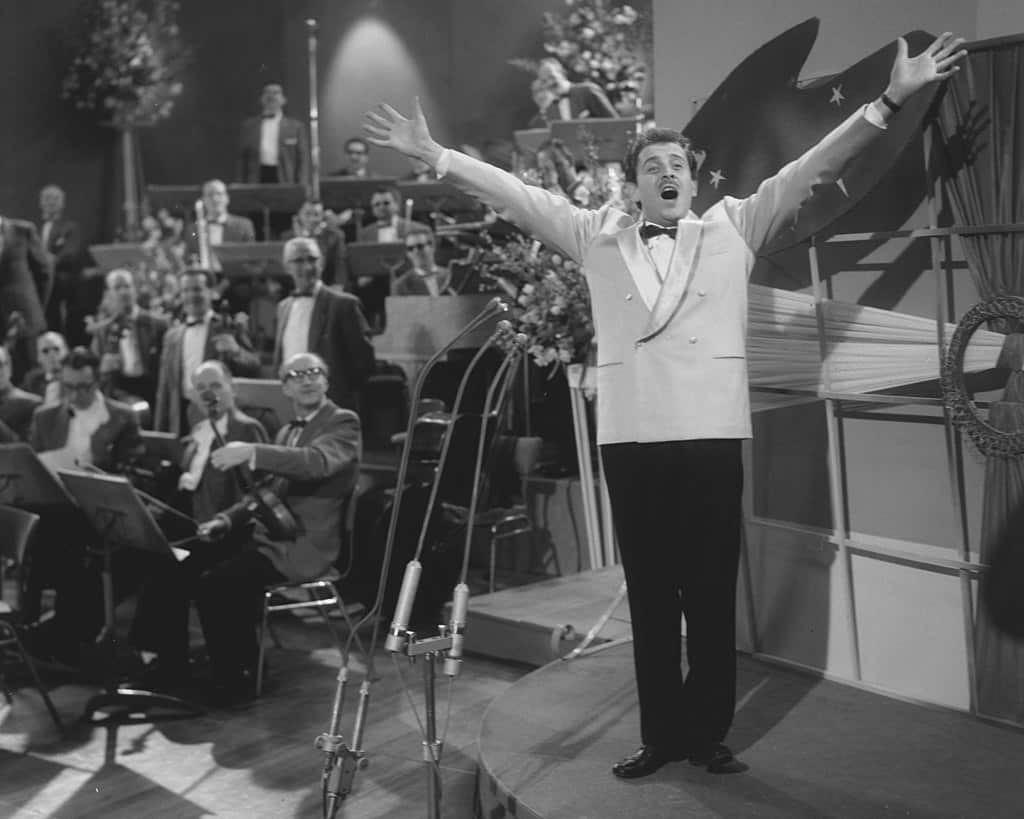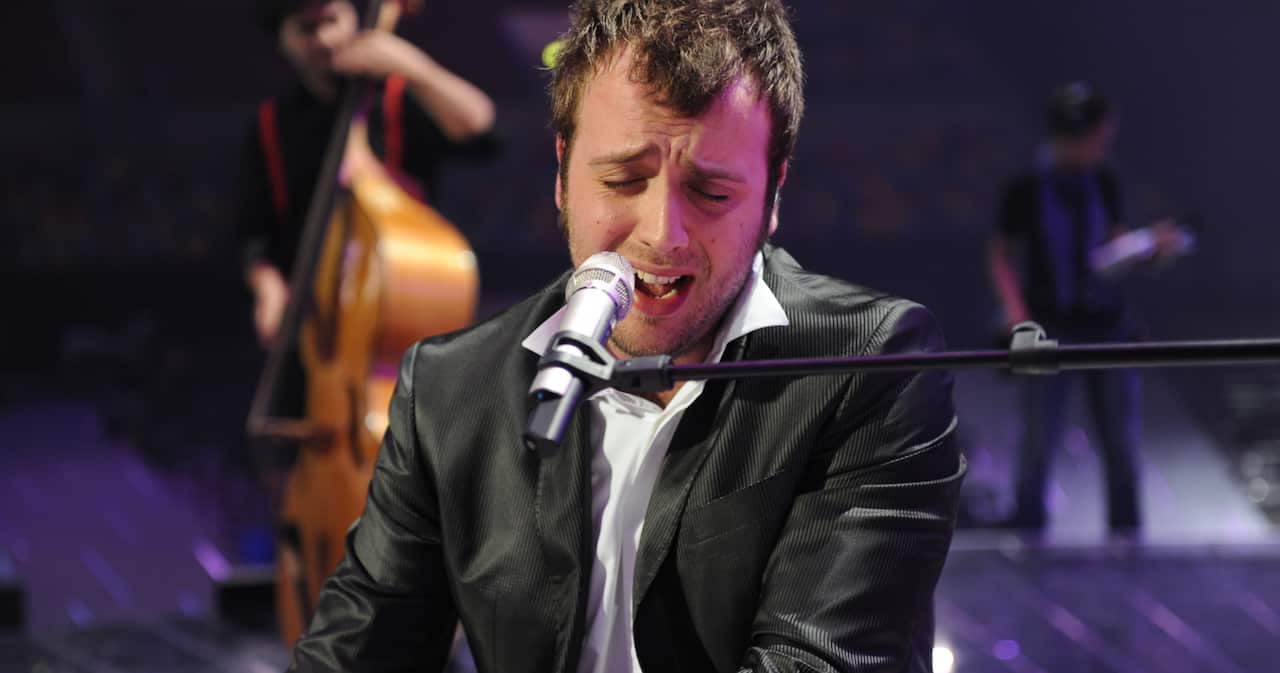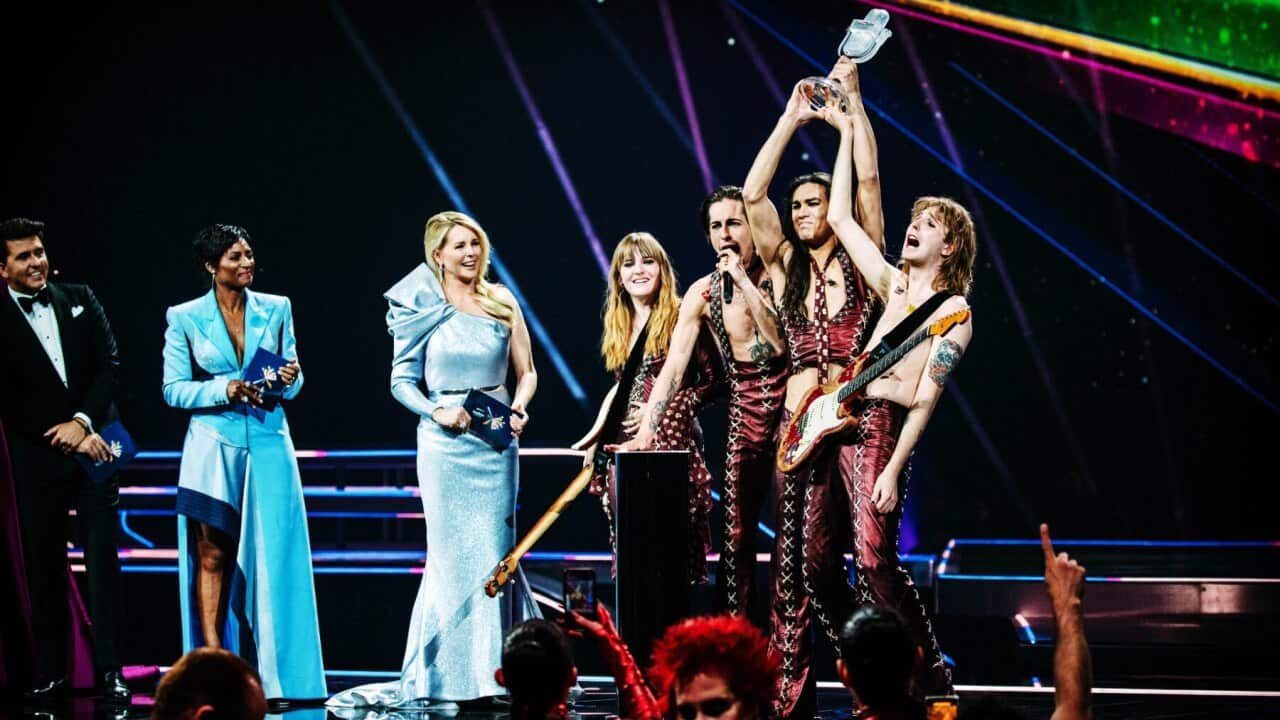There is perhaps no nation with a stronger link to the Eurovision Song Contest than Italy. The country’s Sanremo Music Festival was the original inspiration for the nation vs. nation song competition, and Italy continues to retain its place among the ‘Big Five’ contributors to the ESC. With the country set to play host to the world’s biggest international song contest in 2022, we’re taking a look back at some of Italy’s best Eurovision moments.
‘Nel blu, dipinto di blu’ – Domenico Mondugno (1958)

When the third annual Eurovision Song Contest arrived in the Dutch city of Hilversum in March of 1958, it had been just over a month since the release of Italian singer-songwriter Domenico Mondugno’s single ‘Nel blu, dipinto di blu’, now better known by the words of its distinctive chorus ‘Volare’.
The song had been chosen as Italy’s entry for the competition that same year at the Sanremo Music Festival, but no one could have anticipated the global sensation it was about to become. From the moment he stepped onto the stage, Mondugno was telling a story, captivating audiences with his emotive recount of the flying feeling of love.
It’s a story that went on to be named Billboard’s song of the year, sell tens of millions of copies worldwide, and carve out a legacy as the world’s most played Italian song, but it’s worth noting that it still only managed a respectable third place at Eurovision.
‘Non ho l’età (per amarti)’ – Gigliola Cinquetti (1964)
By the time the Eurovision Song Contest had entered its ninth year, Italy was yet to take out the top prize, but many hoped the competition in Copenhagen, Denmark would finally see their luck change. Sanremo Music Festival winner, sixteen-year-old Gigliola Cinquetti, was selected as Italy’s entrant with the song ‘Non ho l’età (per amarti)’ and a nation’s hopes were suddenly pinned on the teenage girl in the black dress.
Roughly translated as ‘I’m not old enough (to love you)’, the three-minute performance might have been understated in comparison to the extravagant performances we are accustomed to today, but even in the absence of this theatricality, the quiet power of Cinquetti’s voice was undeniably moving.
The greatest evidence of this came in the form of her landslide victory, winning the contest with a staggering forty-nine points, nearly three times as many as the British runner-up. Italy had their victory, and so began a career that saw Cinquetti return to the Eurovision stage for her country in 1974, coming in second place to the contest’s most successful entrants: ABBA.
‘Gente Di Mare’ – Umberto Tozzi & Raf (1987)
If there was ever a decade that lent itself to the glitz and glamour that has become synonymous with Eurovision over the years, it was the 1980s. At that time, Turin-born Umberto Tozzi had already established himself as something of an Italian pop rock icon, so the decision to join forces with rock legend Raf for Italy’s entry to the 1987 competition in Brussels ‘Gente Di Mare’ was inspired.
The duo did not record the song for the contest, but taking their collaboration to Belgium proved to be a stroke of genius. In a duet reminiscent of Bowie and Mercury, albeit one with a more bluesy bent, Tozzi and Raf sang of the ‘people of the sea’ and freedom from the confines of city life. The performance ticked all the boxes from big hair, to even bigger voices, and plenty of denim, not to mention a melody that has stood the test of time as one of Eurovision’s best.
It was enough to secure Italy third place, coming in behind Ireland’s winner Johnny Logan and German band Wind, and proved to be a triumphant return for the country after their brief withdrawal from the competition in 1986.
‘Follia d’amore’/‘Madness of Love’ – Raphael Gualazzi (2011)

The 56th Eurovision Song Contest in Düsseldorf was perhaps one of the most significant for Italy, but this time it was the result of their decade-long absence from the Eurovision stage. Though they had briefly withdrawn from the competition previously, the decision to step away for this extended period meant that a lot was riding on their 2011 performance in Germany. It would ultimately set the tone for their return, so it needed to be memorable, and jazz musician Raphael Gualazzi did not disappoint.
His bilingual rendition of the song ‘Follia d’amore’, known in the competition as ‘Madness of Love’, was of another era, infusing Gualazzi’s love of the jazz genre into this foot-tapping tune, as he transported audiences back to the 1920s when stride piano was born. It was pure class, celebrating instrumentation as much as vocals, and above all else asserted Italy’s being very much back in the competition. Though he was pipped at the post by Azerbaijan’s Ell & Nikki, Gualazzi’s confident performance was rewarded with second place in the 2011 contest. Italy was back.
‘Zitti E Buoni’ – Måneskin (2021)
As far as Eurovision performances go, it’s fair to say that Italy had become known for playing it relatively safe in comparison to its competitors. Though consistent, the country wasn’t known for shaking things up very often, and audiences felt they knew what to expect. Or so they thought until four-piece rock band Måneskin took to the stage in Rotterdam for the 2021 Eurovision Song Contest and turned everyone’s expectations upside down.
The band’s song ‘Zitti E Buoni’ pulled zero punches, from the heavy beats of the first few bars right through to the final roar from lead singer Damiano David, and audiences loved every second of it. In the midst of the COVID pandemic, it was the extreme of Eurovision excess in the best possible way, accompanied by a waterfall of fireworks and glam rock inspired leather, sequins and feathers. Every aspect of the performance said Italy were here to win and they wanted the world to know it.
Sure enough, the country claimed their first victory since 1990, and Måneskin were propelled to international notoriety like no Italian entry before. Though a hint of scandal initially clouded the group’s win, nothing could dim the excitement of what was Italy’s third time to take out the top prize, and the promised return of the competition to Italian shores in 2022.
For all the details on how to watch and vote in the 2022 Eurovision Song Contest, see here:
